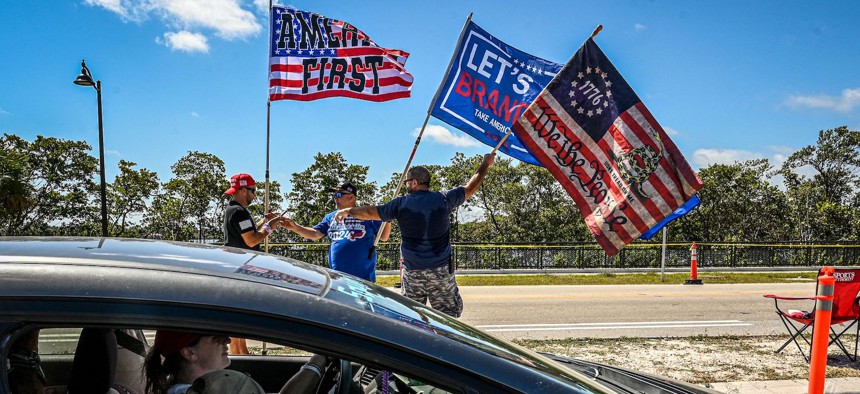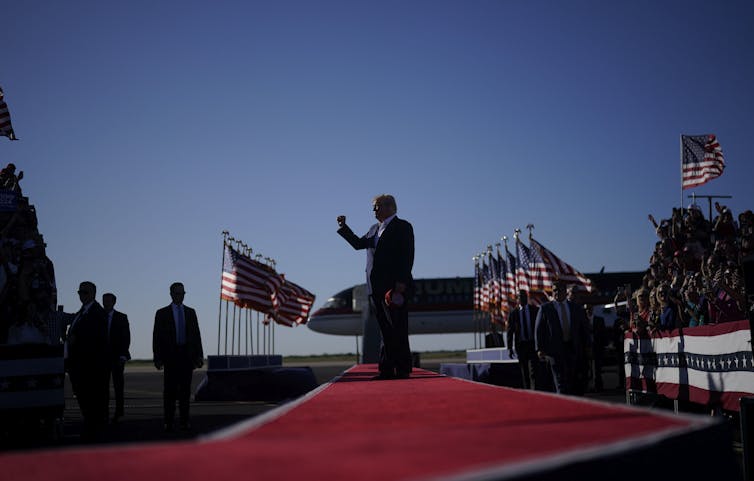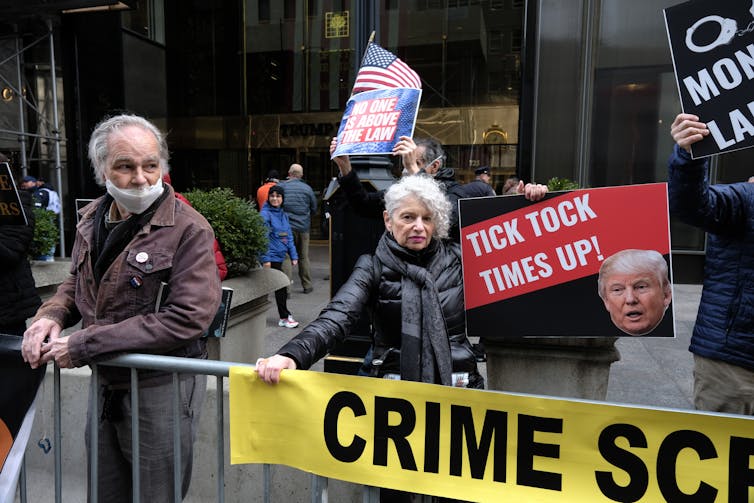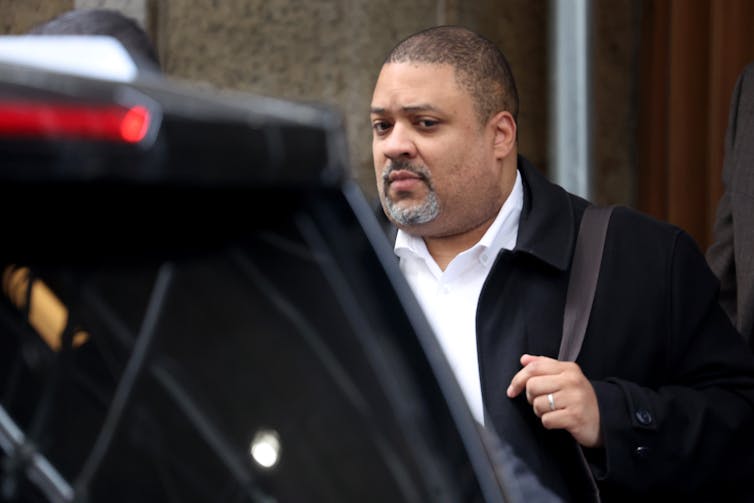
Supporters of former US President Donald Trump protest near Mar-a-Lago Club in Palm Beach, Florida, on March 22. GIORGIO VIERA/AFP via Getty Images
Trump’s Indictment Stretches U.S. Legal System in New Ways – a Former Prosecutor Explains 4 Key Points to Understand
The Manhattan District Attorney will need to prove several different points in its prosecution of Trump. But securing an unbiased jury will also challenge the execution of this unprecedented case.
When former President Donald Trump turns himself over to authorities in New York on Tuesday, April 4, 2023, and is arraigned, the charges on which a Manhattan grand jury indicted him will likely be made public.
Manhattan District Attorney Alvin Bragg obtained the indictment on March 30, 2023, following a grand jury vote, but the exact charges against Trump remain sealed. Multiple media sources are reporting the indictment alleges the former president committed business fraud.
I am a former prosecutor and law professor who studies the criminal justice system. While the complexities of Trump’s case will continue to unfold, The Conversation asked me to break down the complex legal situation. Here are four key points to understand about the prosecution and what will likely come next.

1. Falsified business records are the key issue
From what we understand of the investigation, the charges against Trump appear to stem from a US$130,000 payment in 2016 by Trump’s then-lawyer, Michael Cohen, to an adult film star, Stormy Daniels. In return, Daniels promised not to tell the media about her alleged affair with Trump.
Media reports suggest that there could be about 30 counts against Trump, and at least some of those counts will be felonies.
Just the fact that there are so many counts does not mean that there are many different criminal events or kinds of crimes alleged. Prosecutors often charge similar, repeated conduct – for example, multiple drug sales – as separate counts. In this case, the multiple counts may refer to a series of business records that record the same or similar transactions. Or the charges may, indeed, span multiple alleged criminal events.
Media reports indicate that Bragg does not appear to be alleging that Trump’s payment to Daniels was itself illegal.
Instead, Trump will likely be charged with “falsifying business records” for trying to hide the payment by lying about its nature in the records of the Trump Organization, his company.
Creating a false business record with the intent to defraud is a Class A misdemeanor offense in New York. But the offense can become a low-level Class E felony if Bragg can prove that Trump created false business records for the purpose of facilitating a second crime.
It is not yet clear what the second crime will be – or even that a second crime is being alleged – but possibilities include federal or state campaign finance violations or tax evasion.
2. Bragg will have to prove Trump’s involvement, fraudulent intent
If there is a trial, the prosecution will have to put together a series of pieces to secure a conviction on each of the charges facing Trump.
First, the prosecution would have to prove that the Daniels payment was recorded by Trump officials as something clearly inaccurate. It is not enough to show that the payment was recorded ambiguously – like “miscellaneous” or even “legal services.” The business records at issue must be unequivocally “false.”
Second, it is not necessary that Trump himself created false records. The prosecution would just have to prove that Trump was the direct cause of the false entry – meaning someone followed his specific directions.
Third, the prosecution would have to prove that Trump created the false record for a fraudulent purpose and, to prove a felony, with the specific purpose of committing – or covering up – another crime.
This is important because there could be other potentially plausible reasons the defense might offer, including that Trump sought to avoid embarrassment to his family or himself. Another option is indifference, that Trump gave little thought to how the transaction was recorded. That’s why the details of the allegedly false records, and Trump’s degree of involvement in their creation, will be central questions at trial.
Finally, for the felony offense, the prosecution would also have to prove that there was another crime that was either committed or covered up by using this false business record.

3. It’s the most complex straightforward case in history
While everyone will be watching to see if this case is handled like other cases, differences are inevitable. For example, the New York Police Department and court officers will need to coordinate the arrest process with Trump’s Secret Service agents.
Further complications will arise if there is any prospect of incarceration. Based on what we know now, there is little prospect that Trump will be jailed pending trial for this allegation of a nonviolent crime. And even if he is ultimately convicted, it’s still unlikely he’ll be locked up, based on the nature of the charges and his lack of a prior criminal record. That said, judges have broad discretion in determining sentences.
That is only a small window into the logistical challenges that await the Manhattan district attorney’s office and the New York courts. If this were any other defendant, this would be a relatively straightforward case, the kind that make up the hundreds of cases in a typical prosecutor’s caseload.
However, Trump is not any other defendant. That means this is likely to be the most complex straightforward case in American history.

4. The judicial process will be a messy affair
Most low-level felony and misdemeanor cases are resolved before trial, especially when there is no obvious victim. Typically, the prosecution will offer a plea deal, perhaps including a term of probation, or even propose a diversion program with community service, for example, which will lead to a dismissal of the charges.
It will be interesting to see if Bragg makes an offer along those lines. Even if he does, defendants must typically admit guilt to take advantage of these arrangements, and Trump may refuse for political, personal or legal reasons to admit guilt.
So it’s likely the case will go to trial, a process that will be messy for many reasons – most importantly, the jury.
When choosing a jury in a criminal case, the trial judge is supposed to screen out potential jurors who are biased in favor of, or against, the defendant. That’s normally easy because the jurors have usually never have heard of the defendant.
But most potential jurors will have opinions about Trump and many will need to be excused from jury service because of a lack of objectivity.
In a trial with this much media attention, there will also be people who have strong feelings about Trump and want to be on the jury. Some of them may hide their biases. That’s a problem by itself.
Then, once the trial starts, the media attention will shine a spotlight on the selected jurors. If it becomes clear that the jurors lied or failed to disclose information in jury selection, that could be grounds for removing them from the jury in the middle of the trial. If enough jurors are removed, the case will end in a mistrial, sending everyone back to square one.
So, while there is a lot about this prosecution that isn’t yet clear to the general public, one thing is clear – this will be a case with unprecedented attention and complexity.
![]()
This article is republished from The Conversation under a Creative Commons license. Read the original article.






